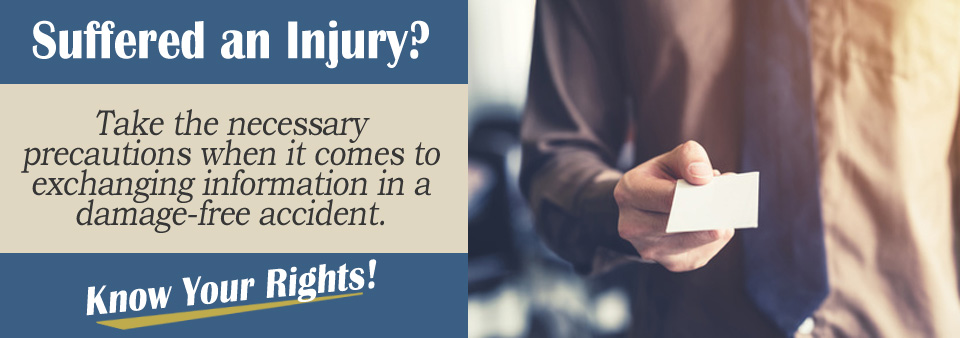Any accident, however minor, can have unexpected and unpleasant consequences. There may be damage to the vehicles, injuries, and/or shock.
In fact, some damage and injuries may not be noticeable until later on.
You or the other driver may decide at a later stage to file a personal injury claim if an injury has occurred or an insurance claim if there has been damage to the vehicle that was not initially obvious. It is best to be prepared for the worst.
Talk to a personal injury attorney if you were injured through no fault of your own. It can be expensive dealing with injuries that you never anticipated. A successful clam can help you cope financially during your recovery.
Tip #1: Exchanging Information is Fine
Even if there seems to be no damage done to either vehicle and no injuries have occurred, there is no reason to refuse to provide contact details if the other driver asks for them.
It is quite possible that damage to the vehicle could become apparent later on closer inspection or an injury could appear after the actual collision.
For example, whiplash is one of those injuries that will not always show up immediately after a car accident. There are some cases where drivers will deliberately try and claim for whiplash injuries after a minor rear end crash.
However, it is the driver’s right to ask to exchange details so there is little you can do about that at the time of the accident.

Tip #2: Take Photos of the Two Vehicles and Ask Any Witnesses for Corroboration
If you still have your wits about you, it may be a sensible precaution to take photos of both vehicles, especially if the other driver asks to exchange information.
As long as you are insured, theoretically you should be covered even if you don’t expect to file a claim, but it still may make a difference to your premium; the other driver may even try and claim more than you are insured for.
If there are any witnesses (even if it’s someone else in your vehicle), you should make a note of their names, contact details and then get them to jot down what they saw or make a brief statement into a voice recorder. This will help to cover you if you receive a claim and help you if you decide to make a claim of your own.
Tip #3: Let Your Insurance Company Know What Happened
If there is no damage to the vehicles and no injuries and you both decide that everything is fine without exchanging details, you shouldn’t have to inform your insurance company.
But if the other driver does ask you to exchange information, it may be wise to make sure you have let your insurance company know and send them any photos or witness statements too.
It is possible that if your insurer does receive a claim from the other driver, the fact that you didn’t report it might be just enough excuse for your insurer to try and wriggle out of making a payment. It might even bring your premium up more than if you had told them.
Tip #4: If You Were Injured, Talk to a Personal Injury Attorney Yourself
It’s another matter if you have been injured yourself, or someone else was injured in your car, even if your car seemed undamaged. You may decide to file a personal injury claim against the driver.
It might be worth getting yourself checked out by a doctor even if you think you are fine, especially if you have been rear ended. Neck injuries like whiplash may not be discovered until later. Talk to a personal injury attorney as soon as you can after the accident so that you can discuss your legal options.